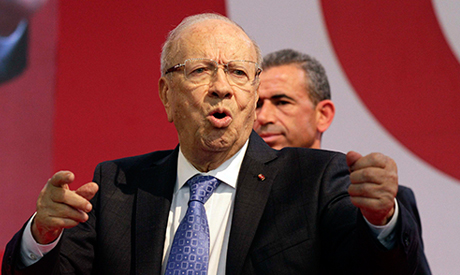
Beji Caid Essebsi, leader of Tunisiaís secular Nidaa Tounes party and presidential candidate (Photo: AP)
Tunisia's first democratic presidential election have seen presidential candidate Bieji Caed Essebsi, 88, emerge as the most influential and powerful politician in Tunisia after the 2011 revolution.
For the young people who sparked Tunisia's revolution and who make up 60 percent of the population, Essebsi is not a familiar figure, given that he disappeared from the media in 1991.
It is the older generation who remember Habib Bourguiba's era, before the ousted president Zinedine Ben Ali took power in 1987, who are also familiar with Essebsi.
That generation still remembers how the country's resources fell into the hands of Bourguiba's friends and family.
And now with Essebsi frontrunner for president after the first round of voting, and his party, Nidaa Tounes, dominating the parliament that will form the government, he is older than Bourguiba was when he was forced to leave office.
In fact Essebsi, who was at the time was the Tunisian ambassador to West Germany, said that based on the medical reports, the national duty forces to recognize that the aging leader Bourguiba has become completely incapable of fulfilling his role as President. "
Essebsi is also 11 years older than Morocco's President Abdelaziz Bouteflika, Tunisia's larger neighbour, whose health is deteriorating according to the news reports this week.
Despite this paradox, Essebsi has much support from Tunisian media.
In the first round of voting in the presidential election, 38 percent of voters voted for Essebsi, the same amount of votes that his party had gained in last month's parliamentary elections.
Essebsi has benefited from the revival Bourguibism and the emotional appeal of the parental relationship between the leader and the people. This would not have been possible without the panic of the elite and middle class from the mistakes of "Troika" rule, led by Ennahda Party, the Salafist movement and the terrorism acts in the past three years.
His rival Moncef Marzouki won 33 percent of votes, while his party, the Congress for the Republic, only won 23,000 votes in parliament.
Results suggest polarisation between Essebsi/Nidaa Tounes and Marzouki/the Islamist party Ennahda even though Ennahda leaders had announced that they were not supporting any candidate in the first round.
On the other hand, estimations suggest that 75 percent of voters between the age of 18 and 35 had boycotted the elections, and some predict this number might rise in the second round.
Many who boycotted the elections cite the polarisation, which is heavily consolidated by the media, between what they call the return of the Ben Ali regime represented by Essebsi and Islamic rule which sold out the revolution and its aims, meaning Marzouki and Ennahda.
Essebsi's chances of winning does not only come from the youth boycott and his party's parliamentary win, but also his promises to some figures of ministerial and government positions.
This will determine the other three candidates Hamma Hammami (who came third position in the first round), Salim Raiahi, and Kamal Morgan's position as to whom to support in the second round. Hammami's supporters especially are divided between pro-vote and pro-boycott in the second round, and are accusing Ennahda of complicity in the assassination of Mohamed Brahmi and Chokri Belaid.
The candidates, who came from the third to sixth place in the presidential elections, received around 20 percent of votes in the first round. Only 5% of those might vote for Marzouki.
Nonetheless, any surprises in the first plural elections in Tunisia cannot be discounted. Yet, given the above, Essebsi seems the most likely candidate to win the upcoming run-off vote.
Short link: